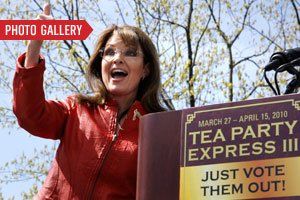
Both liberals and conservatives have a stake in portraying the Tea Party movement as a bunch of political newcomers without much experience. For conservatives, it makes the movement a grass-roots wave of true populist sentiment that will throw the bums out. For liberals, it's evidence that Tea Partiers are dangerously ignorant and have no clue what they're talking about. Unfortunately for both sides, it's simply not an accurate portrait of reality.
Let's take two big stories this weekend. The first is Christine O'Donnell, the Delaware Republican Senate candidate whose bizarre pronouncements on everything from Satanism to sex-ed dominated the last 72 hours (and counting!) of the news cycle. She's been repeatedly referred to as inexperienced. It's true that O'Donnell hasn't had a lot of luck in actually reaching elected office. But she's the Adlai Stevenson of Delaware Senate seats: this is her third run, following an unsuccessful primary in 2006 and a successful nomination in 2008; she was then trounced by Joe Biden. And before that, she had a long career as an activist, appearing on Bill Maher's Politically Incorrect alone nearly two dozen times—which, given Maher's slow drip of embarrassing clips, she may come to regret. In short, she's not some soccer mom who got outraged and then got involved.
Meanwhile, The New York Times casually propagated the Tea Party myth in Sunday's lead story on Mike Bloomberg's political advocacy, referring to Nevada Republican Senate candidate (and Gaggle favorite) Sharron Angle as "a political neophyte." But that's not really true: Angle served a solid six years in the Nevada Assembly, from 1999 to 2005, and she only barely missed being nominated for a U.S. House seat in 2006. At the risk of dredging up the now-outdated "Obama is inexperienced" meme, her service at the state legislature level is even a little longer than the current president's tenure in the Illinois state legislature before he jumped to the U.S. Senate.
And boy, that's only the beginning. Here are a few Tea Party-affiliated standard bearers, with their rather expansive governmental qualifications:
- Marco Rubio (Fla. gubernatorial candidate): eight years in the Florida state house, including two as speaker.
- Ken Buck (Colo. gubernatorial candidate): worked for Dick Cheney during the Iran-Contra investigation; later worked at the Department of Justice and as a local district attorney and U.S. attorney.
- Scott Brown (elected to U.S. Senate in 2010): 12 years in the Massachusetts state House and Senate.
- Nikki Haley (S.C. gubernatorial candidate): six years in the South Carolina house.
There are, of course, exceptions. Tim Scott, a South Carolina state representative who made headlines for beating Strom Thurmond's son in a U.S. House Republican primary, has served only two years in the state house. Rand Paul, the Kentucky GOP Senate nominee, doesn't have much electoral experience, but he has spent years as an activist, working with his father, Texas Rep. Ron Paul.
Overall, however, it's hard to take imputations of inexperience too seriously. And let's not even get into the major figures in the Tea Party movement, many of whom have ties to the mainstream GOP apparatus. Jon Stewart skewered Dick Armey, the former House majority leader, when he went on The Daily Show to promote his new book, Give Us Liberty: A Tea Party Manifesto. Stewart pointed out that it was hard for Armey—whose FreedomWorks is one of the most influential Tea Party groups—to claim he's anti-establishment considering that he led the Republican Party's Congressional delegation. And the Times profiled Sal Russo, a long-time GOP fundraiser who has given hundreds of thousands to Tea Party candidates. Piles of cash have also come from the Koch brothers, veteran right-wing philanthropists.
But the myths about the Tea Party keep rolling. Again, it's easy to see why both sides have a stake. Liberals' first reaction to the Tea Party was to scream "Astroturf!" It should be clear by now that there's more to it than that—even if much of the money is coming from the usual suspects. Instead, the pendulum has swung in the opposite direction, with many commentators opining that the Tea Party really is completely grass-roots. And that's just as misleading. If voters really do want a clean sweep of the halls of Congress (and we'll see just how real the anti-incumbent "wave" really is come November), they should know that the "outsiders" they're considering are often not as independent as they may seem—which can have both benefits and drawbacks.
Democrats are right there with them, hollering about what a bunch of unseasoned fools their opponents are. That's deceptive, too, and it's not clear that it's helping. After all, the liberal strategy of bashing Sarah Palin at every turn has, if anything, made her stronger. Now, Democrats are apparently trying to tie O'Donnell to the "bankrupt Washington culture" train. That's innovative but a bit schizophrenic, since DNC Chair Tim Kaine is also going around talking about how far candidates like O'Donnell are from the mainstream.
It might be easier to just tell it like it is. But hey, in politics, that's a real wingnut outsider opinion.
Uncommon Knowledge
Newsweek is committed to challenging conventional wisdom and finding connections in the search for common ground.
Newsweek is committed to challenging conventional wisdom and finding connections in the search for common ground.
About the writer
To read how Newsweek uses AI as a newsroom tool, Click here.








